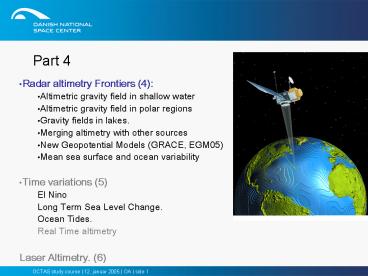Radar altimetry Frontiers 4: - PowerPoint PPT Presentation
1 / 23
Title: Radar altimetry Frontiers 4:
1
Part 4
- Radar altimetry Frontiers (4)
- Altimetric gravity field in shallow water
- Altimetric gravity field in polar regions
- Gravity fields in lakes.
- Merging altimetry with other sources
- New Geopotential Models (GRACE, EGM05)
- Mean sea surface and ocean variability
- Time variations (5)
- El Nino
- Long Term Sea Level Change.
- Ocean Tides.
- Real Time altimetry
- Laser Altimetry. (6)
2
Gravity in shallow water
- Problem that sea state is high, and data are bad
because of land-contamination. - Altimetric data must look like normal ocean
like waveform (Brown model) in order to determine
the sea surface height. - High percentages of sea ice-like and patch
waveforms, and low percentages (10) of ocean
waveforms are observed up to 5 km from the coast.
- After about 25 km ocean waveforms dominate
- The trick is to retrack data allowing for more
waveform - types (more by P Berry).
- This yields many more data close to the coast.
3
Retracking ERS-1 GM for geodetic purposes.
- ERS-GM have been retracked using the EAPRS
rule-based Expert System (P. Berry - De Montford
University). - System contains 11 retrackers tuned for
land,ocean, and ice retracking. - The retrack-inversion uses logaritmic noise
transformation. - Retracking is more complicated but superior to
retracking by Sandwell/Smith and GTech. - Lakes, Ice evertying is retracked.
Much more by P. Berry
4
1 Hz NonRetracked
5
2 Hz.retracked
6
Polar regions.
- Problem that only a few altimetric data look
like normal ocean like waveform (Brown
model). - Only very few data from open water between or on
- Ice will create normal waveform.
- The trick is AGAIN to retrack
- data allowing for more
- Waveform types (more by P Berry).
7
East Greenland importance of Retracking
1Hz Retracked Unretracked
8
Comparisons.
LaxonMcAdoo 97
KMS04
Error - No data east of 15W
9
Lakes
10
Lake Victoria - Africa
Altimeter is in ice-model so only ice
retrackers can be use. Data is mainly retracked
using the EAPRS thresshold retracker. ocean-retrac
ker can be modified to retrack icedata (testing
ongoing)
11
Lake Victoria
12
Smaller lakes
13
Merging Altimetry with other sources.
- Data in coastal regions (Disko Bay) on the West
Greenland coast - Airborne
- Marine
- Altimetry
14
Merging altimetry airborne gravity data.
- Using LSC to merge data
- Altimetric geoid height with airborne gravity
observations - Aposteriori gravity error.
- C Covariances,
- D Noise variance
15
Interpolated onto high quality marine
observations.
- Notice Airborne constrain the mean value of
altimetry. - Airborne compared considerably better with marine
data at x-over locations.
16
New Satellites.
- CHAMP 2000, GRACE 2002, GOCE 2006
- Will improve global geopotential models at longer
spatial - wavelength
- With better geoid, we will also get better
separation of - mean dynamic topography using altimetry to
constrain - Mean Sea surface height
17
EGM05.
- EGM96 Geoid Absolute Accuracy - worldwide 50 cm -
1 meter (total omission commission global rms
error to nm360) - Next EGM Geoid Accuracy Goal - worldwide 15 cm
- (total omission commission global rms error to
nm720) - based on new satellite mission data from CHAMP,
GRACE, GOCE - new surface and airborne gravity data
- improved modeling of the data
- 4 cm commission error from GRACE and GOCE out to
nm300 - 9 cm omission error beyond 720 following Kaula's
Rule - NMAs detailed gravity data are expected to meet
a 11 cm commission error requirement for degrees
301-720. - KMS coorporates extensively with NMA on
delivering airbornealtimetric gravity
18
Mean Sea surfaces
- Reference surface
- Geo-centric
- Consistent with GPS / GNSS
- Example Mean sea surface from a merge of about
10 years of altimetric sea surface heights. - Study the MSS N MDT (GOCINA / OCTAS)
- Used to map mean currents MDT MSS-N
19
KMS04 Global Mean sea surface.
In principle complete coverage in space and time
is needed. Get the best out of ERM (Variability
averaged out and GM (high spatial resolution)
- Completed March 2004.
- Derived from T/P, T/P TDM, ERS1 ERM, ERS2 ERM,
GFO ERM data. - Geosat GM, and ERS-1 GM data
- Based on 9 years of data using T/P as reference
(all satellites referenced to T/P) - Based on Pathfinder Data (ERM), RADS Data (GM)
- High resolution, 2 min grid. (82S to 82N)
- Editing relative to GGM01S
- EGM96 hybrid geoid model.
KMS04-N(EGM96)
20
KMS04MSSError Field.
Accuracy 4 cm
21
GOCINA is an EU FP5 project to improve Geoid M
ean Sea Surface Mean Dynamic Topography Investi
gating MSS N MDT Compare best MSS
(KMS04 MSS) N GRACE Airborne Tallin Geoid
MDT Ensemble of OCCAM, RIO Investigate
differences/errors to learn more. For joint
exploitation of ENVISAT and GOCE in ocean
circulation studies Climate modeling Operatio
nal assimilation
22
EGM
EGM
GRACE
GRACE
OCCAM
WSOA
GOCINA
(Tapley et al. GRL, 2004)
23
Arctic Ocean
KMS04 EGM96
KMS04 GGM01 / EGM96































